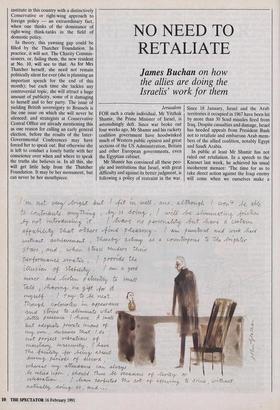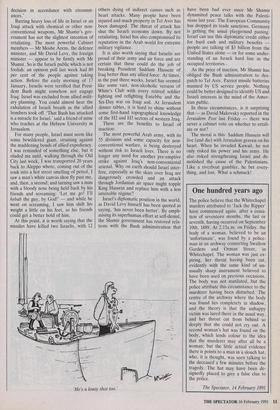NO NEED TO RETALIATE
James Buchan on how
the allies are doing the Israelis' work for them
Jerusalem FOR such a crude individual, Mr Yitzhak Shamir, the Prime Minister of Israel, is astonishingly deft. Since war broke out four weeks ago, Mr Shamir and his rackety coalition government have hoodwinked much of Western public opinion and great sections of the US Administration, Britain and other European governments, even the Egyptian cabinet.
Mr Shamir has convinced all these peo- ple and institutions that Israel, with great difficulty and against its better judgment, is following a policy of restraint in the war. Since 18 January, Israel and the Arab territories it occupied in 1967 have been hit by more than 30 Scud missiles fired from Iraq. Despite casualties and damage, Israel has heeded appeals from President Bush not to retaliate and embarrass Arab mem- bers of the allied coalition, notably Egypt and Saudi Arabia.
In public at least Mr Shamir has not ruled out retaliation. In a speech to the Knesset last week, he achieved his usual incoherent menace: 'The time for us to take direct action against the Iraqi enemy will come when we ourselves make a decision in accordance with circumst- ances.'
Barring heavy loss of life in Israel or an Iraqi attack with chemical or other non- conventional weapons, Mr Shamir's gov- ernment has not the slightest intention of retaliating. The most powerful Cabinet members — Mr Moshe Arens, the defence minister, and Mr David Levy, the foreign minister — appear to be firmly with Mr Shamir. So is the Israeli public which is not foolish: an opinion poll last week had 80 per cent of the people against taking action. Before the early morning of 17 January, Israelis were terrified that Presi- dent Bush might somehow not engage Iraq: Israel was excluded from allied milit- ary planning. You could almost hear the exhalation of Israeli breath as the allied bombers took off. 'That Bush has attacked is a miracle for Israel,' said a friend of mine who teaches at the Hebrew University in Jerusalem.
For many people, Israel must seem like some bewildered giant, straining against the maddening bonds of allied expediency. I was reminded of something else, but it eluded me until, walking through the Old City last week, I was transported 20 years back to Aleppo where, coming out of the souk into a hot street smelling of petrol, I saw a man's white canvas shoe fly past me, and, then, a second; and turning saw a man with a bloody nose being held back by his friends and screaming: 'Let me go! I'll kebab the guy, by God!' — and while he went on screaming, I saw him shift his weight a little on his feet, so his friends could get a better hold of him.
At this point, it is worth saying that the missiles have killed two Israelis, with 12 others dying of indirect causes such as heart attacks. Many people have been injured and much property in Tel Aviv has been damaged. The threat of attack has shut the Israeli economy down. By not retaliating, Israel has also compromised its reputation in the Arab world for extreme military vigilance.
It is also worth saying that Israelis are proud of their army and air force and are certain that these could do the job of breaking President Saddam Hussein of Iraq better than any allied force. At times, in the past three weeks, Israel has seemed like some vast, non-alcoholic version of White's Club with every retired soldier fighting and refighting Entebbe and the Six-Day war on Iraqi soil. At Jerusalem dinner tables, it is hard to shine without some first-hand topographical knowledge of the H2 and H3 sectors of western Iraq. These are the benefits to Israel of inaction: The most powerful Arab army, with its 55 divisions and some capacity for non- conventional warfare, is being destroyed without risk to Israeli lives. There is no longer any need for another pre-emptive strike against Iraq's non-conventional arsenal. Why on earth should Israel inter- fere, especially as the skies over Iraq are dangerously crowded and an attack through Jordanian air space might topple King Hussein and replace him with a less amenable regime?
Israel's diplomatic position in the world, as David Levy himself has been quoted as saying, 'has never been better'. By emph- asising its superhuman effort at self-denial, the Shamir government has restored rela- tions with the Bush adminsitration that 'He's a lousy shot too.' have been bad ever since Mr Shamir dynamited peace talks with the Palesti- nians last year. The European Community has dropped its trade sanctions. Germany is getting the usual playground pasting. Israel can use this diplomatic credit either for hard cash and military benefits — people are talking of $3 billion from the United States alone — or for some under- standing of an Israeli hard line in the occupied territories.
As the price of inaction, Mr Shamir has obliged the Bush administration to des- patch to Tel Aviv, Patriot missile batteries manned by US service people. Nothing could be better designed to identify US and Israeli interests in the mind of the Amer- ican public.
In these circumstances, is it surprising that — as David Makovsky reported in the Jerusalem Post last Friday — there was never a cabinet vote on whether to retali- ate or not?
The moral is this: Saddam Hussein will live (and die) with Jerusalem graven on his heart. When he invaded Kuwait, he not only risked his power and his army. He also risked strengthening Israel and de- molished the cause of the Palestinians. Like a riverboat gambler, he bet every- thing, and lost. What a schmuck!



















































 Previous page
Previous page